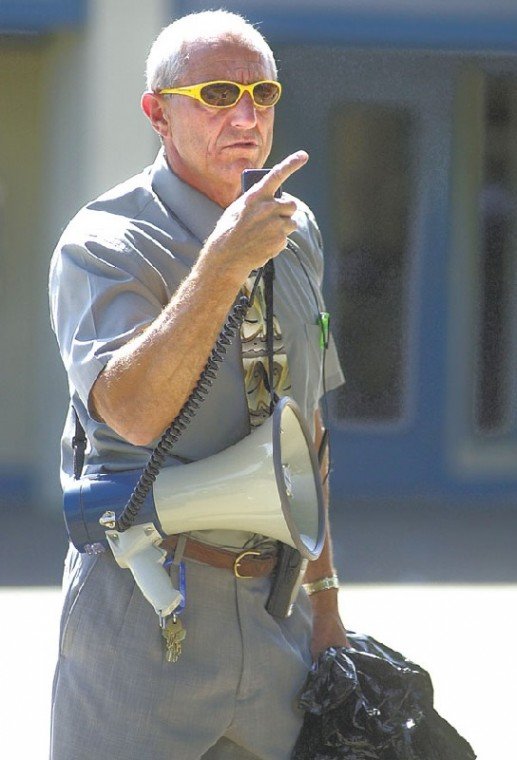Gilroy High students must make it to class on time
– or perform ‘tardy sweeps,’ cleaning up trash on campus
Gilroy – A seemingly effective tardy practice Gilroy High School administrators implemented two years ago may conflict with new school board policy, leaving some trustees questioning whether there is a better method of cleaning up students acts.
However, GHS Principal James Maxwell believes the practice works and has no plans of changing it.
“Not unless the board came down on me and said, ‘You can’t do that,'” Maxwell said. “Sometimes what works, works.”
Since he arrived this summer, Maxwell noticed that there is less of a tardy problem at GHS than at the schools he has worked at in the past.
The school’s current punishment for being late: Students perform ‘tardy sweeps,’ which means they collect garbage after the brunch and lunch periods. They have the option of coming afterschool for 45 minutes on work detail, but most choose collecting garbage instead.
During lunch Tuesday, after the first bell rang warning students that they have 10 minutes before class begins, Dean of Students Mani Corzo started yelling into his megaphone.
“Thank you ladies and gentlemen, it’s time to go to class please,” he said, motioning for students to start heading indoors.
According Corzo – who devised the plan two years ago – the practice is helping reduce the number of tardies on campus.
Three years ago from periods three through six, there were 16,000 tardies in one year at GHS, he said. The school began cracking down on tardies two years ago – by instituting daily tardy sweeps – and is down to 2,500 per year, he said.
“This is just a deterrent to get kids to class on time,” he explained of the garbage collection.
While the practice has reduced the number of tardies, the punishment may conflict with board policy 6116 regarding classroom interruptions, passed by Gilroy Unified School Board members in June with the intent of protecting instructional time.
According to the policy, the use of intercoms should be restricted, cell phones are banned during class time and administrators should try to schedule extracurricular and other non-classroom related activities to occur during non-instructional time.
The policy also reads: “That, whenever possible, school maintenance and housekeeping activities be scheduled before or after school hours.”
Despite the visual threat of Corzo holding trash bags, the two bells and multiple warnings from school administrators to hurry to class – a handful of students still couldn’t make it there on time.
For the next five minutes, about 10 students walked around the courtyard filling small garbage bags with litter left on picnic tables and on the ground by their classmates.
Tuesday’s sweep was junior Jaime Cavallero’s fifth this year. He estimates he picked up trash 25 times last year and does not believe the practice works to prevent students being late to class.
“Give us more time to get there,” he said.
GUSD board member Tom Bundros believes the intent of the punishment is positive, but disagrees with the timing.
“Tardies require a consequence,” he said. “(But) it seems inconsistent for them to take students out of class for missing class.”
Bundros believes tardy students’ punishment should not interfere with their classmates’ instruction. He wants the practice changed so that, “The kids perform their consequence on their own time, which includes during lunch, afterschool or on Saturdays.”
Corzo believes the method of daily sweeps changing the culture at GHS.
“I’ve even seen kids running to class – I’ve never seen that before,” he said. “They don’t miss more than four to five minutes of class. If we can help that kid get to class early the next day, I think it’s worthwhile.”
He is hoping that students will learn punctuality now so it doesn’t become a habit later in life in the workplace.
GUSD board member Dave McRae supports the tardy sweeps, but understands the individual student may suffer academically from missing out on instructional time.
“You take a slight hit on that occasion and hope that there’s a net benefit,” he said. “If that five minutes saves them five tardies in the end then I think it’s a good thing … The intent is to get people in class. Overall, I think it helps. It’s a disruption when someone walks in the door late.”












